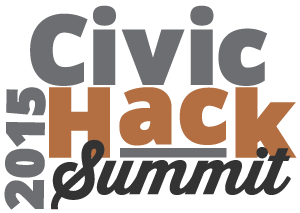Code Across Austin V: Civic Hack Summit Recap
 Code Across Austin V / Civic Hack Summit was held on Feb 28, 2015. This event was part of national Code Across activity. sponsored by Code for America.
Code Across Austin V / Civic Hack Summit was held on Feb 28, 2015. This event was part of national Code Across activity. sponsored by Code for America.
For this year's Code Across Austin event, we decided to take a new approach to the conventional hackathon model. With the help of many community partners and dedicated volunteers, we believe we succeeded.
Conventional hackathons usually combine project ideation, development, and deployment into a single event. The result is one or two projects with real potential, while the rest fall by the wayside.
The 2015 Civic Hack Summit, in addressing the aforementioned pitfalls, was designed to produce a collection of plans for projects that could anchor a year-long civic hacking effort.
First, four guest presenters spoke about the potential for civic technology to improve the lives of Austin-area residents.
Austin City Council Member, District 4, Greg Casar spoke about the need for data-driven tools to enhance decision making at City Council. For example, we might know about areas in Austin with too few parks, but knowing exactly who and how many people are affected by the issue would strengthen any proposal for action.
Austin Monitor Publisher Michael Kanin shared his experience working with the City to release the raw data from the AMANDA database, the system used to track all permits relating to building construction, remodeling, and demolition. Kanin spoke of the importance of working with the City to reach shared goals, and outlined his plan for a using the AMANDA data to create a more user-friendly and accessible tool.
Chip Rosenthal, chair of Open Austin, provided attendees with a real example of what makes a hack-a-thon project successful. After several attempts to create a tool to connect lost pets with their owners, it wasn’t until the third iteration that the project successfully deployed. Why was this the case? Chip identified community need and resource opportunity as crucial elements for Pet Alerts’ success. The need for people to reconnect with their lost pets always existed, but before the third iteration, the data was unreliable. After the Pet Alerts developers reached out to the City, Animal Services began uploading its animal intake data to the City’s open data portal. The Pet Alerts developers were finally able to match the need with the opportunity, and recently deployed a successful beta application.
Finally, Eric Boggs from the Austin Center for Design, spoke about a unique approach to app development: human centered design. The approach consists of research, synthesis, and prototyping, with each phase incorporating information and insights about the intended users and their needs. These strategies are essential for creating community buy-in and maximizing potential for a successful hack project.
With all this information, six hours of time at the Iron Yard, and plenty of sticky notes, what did we achieve at the Civic Hack Summit? Seventy participants split into 6 groups and generated a wealth of problem statements. Then, each group selected their three favorite statements and presented them to the entire group. Attendees then self-selected into the problem statements they wanted to work on during the afternoon session.
To facilitate the move from a problem statement to a project, we hacked a tool commonly used in the agile methodology called the “business model canvas” with the help of the City and local volunteers. This new “Civic Tech Planning Canvas” gave attendees the framework to develop a successful project plan. As far as we know, this was the first implementation of the Civic Tech Planning Canvas at any hackathon.
Using the canvases, groups created 11 different project proposals within six policy themes, ranging from a noise ordinance mapping tool to a streamlined portal for accessing government services and forms.
- Development & Land Use
- Noise Complaints
- Granny Flats
- Transportation
- City Paths Policy Report
- City Path User App
- CapMetrics
- Sustainability
- Zero Waste Attainment
- Health & Social Services
- 211 Data
- Broadband & Digital Opportunities
- Streamlined City Portal UX
- Map My Broadband
- Civic Engagement
- Budget Out of the Box
- Council Connect
But the hacking doesn’t end here. From now until the National Day of Civic Hacking, these projects will be available for the community to develop and refine using the information and ideas produced at the Civic Hack Summit. We were extremely impressed with the 11 projects, and our goal is to help these ideas grow into successful deployment.
If you'd like to connect with one of these projects, please join us at one of our periodic civic hack nights. The next hack night is scheduled for Monday, March 9. Or, join our email list to stay up-to-date on latest news and activity.